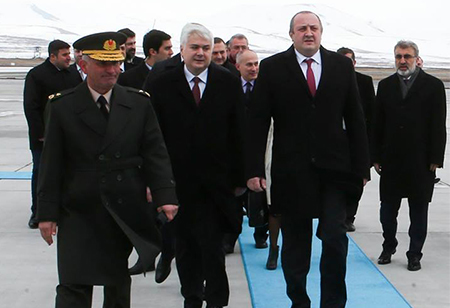Georgia links Caspian Sea to Europe with gas delivery

Work has begun today on a new gas pipeline that will travel through Georgia to better connect Europe with gas from the Caspian Sea, thus reducing dependence on Russian gas.
Georgia’s President Giorgi Margvelashvili visited Turkey’s Kars region today where he and his Turkish and Azerbaijani counterparts attended a ceremony to mark the beginning of the $10 billion USD Trans-Anatolian Natural Gas Pipeline project (TANAP).
Today in #Kars with great friends of #Georgia. @RT_Erdogan@presidentaz. #Turkey#Azerbaijanpic.twitter.com/SaML45NMtm
— President Of Georgia (@MargvelashviliG) March 17, 2015
Construction on the project formally began today after the three presidents’ laid the foundations of the new pipeline project. The new gas pipeline will pump gas from the vast Azerbaijani Shah Deniz 2 field to Turkish and European Union (EU) consumers with the aim of reducing dependence on Russian gas.
The 1,850 km TANAP project, which is due to be completed in 2018, will link the existing South Caucasus Pipeline (SCP) which connects Turkey to the Azerbaijani gas fields in the Caspian Sea, through Georgia.
Adviser of the President of Georgia, Giorgi Abashishvili, said it was very important for Georgia to be part of this project.
"Gas will be delivered to EU member countries through Georgia. This is a very important project in terms of EU energy safety. To be part of this project is also very beneficial for Georgia,” he said.
TANAP is part of the Southern Gas Corridor project that will bring gas from Azerbaijan to Europe, and from sources other than Russia. Current plans envisaged linking the TANAP with the Trans-Adriatic Pipeline (TAP), which brings gas from western Turkey to Greece, Albania and across the Adriatic to Italy.
According to a partnership agreement signed last week, Azerbaijan's state energy firm SOCAR and Turkey's Botas will hold 58 percent and 30 percent stakes respectively in the project, while energy giant BP will have a 12 percent share.
The pipeline should help Turkey and EU countries reduce their dependence on importing gas from Russia by exploiting the Shah Deniz 2 field, which according to BP, will produce 16 billion cubic metres of gas per year.
 Tweet
Tweet  Share
Share